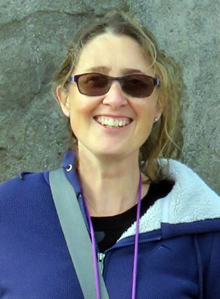The arrival of COVID19 has presented new and pressing challenges for those of us who live with disability. Dr Meredith Perry, an Associate Professor at the School of Physiotherapy in Wellington is engaged with the well-being of our disabled - and those who support them - under active alert conditions.
Dr Meredith Perry, an Associate Professor at the School of Physiotherapy in Wellington is engaged with the well-being of our disabled - and those who support them - under active alert conditions.
Meredith's research helps those living with disability to enjoy connected lives within inclusive communities, and we spoke with her about her vital role in the Ministry of Health's response to the pandemic.
Fast strategic thinking
Successive lock-downs since March of 2020 have proven life-changing for many.
Necessary restrictions on movement leave some of us more exposed to illness and vulnerable to social isolation. Some disabled Kiwis have found it harder to access important health information while others have had difficulties maintaining previously normal levels of care.
Meredith was asked to join the communications advisory team within the Disability Directorate in order to gather and rapidly collate information which the team could use to develop strategies, clarify issues and smooth the path for disability service providers and those in their care.
Imagined bubbles
The New Zealand government's response to the first outbreak of COVID19 was co-ordinated from Wellington where Dr Tristram Ingram works at the School of Medicine.
Looking for a way to provide guidance for the disabled about who should and should not enter their homes under lock-down conditions Dr Ingram came up with the vivid image of 'bubbles' as a way of describing both protection and fragility.
"I remember the first time I saw Prime Minister Jacinda Ardern say it. It was like 'wow, she said it', our concept got out there."
Many disabled people living independently rely on regular visits from healthcare workers who had to learn how to best manage intersecting bubbles during changing phases of lock-down. Those working in-home with the disabled often carry out aerosol-generating procedures which can expose bubbles of individuals, families and whānau to greater risk of exposure to the virus.
Targeted measures
All New Zealanders must be able to access information and equipment to help keep ourselves safe at this time. Each item of information must be up to date, easily available and in usable formats.
Where print, online and braille information related to the outbreak already existed, was all of it accurate and accessible to the disabled living under Levels 1 to 4? Early audits showed that there were some deficits which prompted changes in existing materials and the urgent development, design and distribution of new customised resources.
Meredith's team received sector concerns, queries and complaints through various channels in many different formats, and a torrent of raw data had to be well handled and safely recorded if it were to be of use.
They were soon able to pinpoint key and repetitive issues (such as supplies of adequate PPE) and to action practical measures to address many of them within existing legal frameworks. Treatments for associated health conditions and co-morbidities came to a halt for some due to pressure on existing people and processes. In-home services were at times put on hold while complex questions were clarified.
As a physiotherapist and educator, Meredith had a prominent role in creating pathways for the urgent design and development of targeted information and resources for disability groups most affected by lock-down measures and tactics. When decisions are being made in the shadow of COVID19 usual processes must be interrogated to help ensure that all New Zealanders have access to information that is fit for purpose.
Sharper focus on equality
Because patients with disability are experts in their own lives they must have welcoming places at the same high tables to help plan effective and inclusive responses to events such as this pandemic.
Associate Professor Meredith Perry is confident that some new urgency exists to effect legislative change where it is needed and that better-designed systems and processes based on principles of universal design can be put in place. She believes that the ripples from COVID19 have brought issues of inequality into sharper focus and is encouraged to see that those impacted by recent events are very active participants in disability sector-related conversations at the highest levels.
Useful links
Otago Bulletin article: Fragile but beautiful: Otago academic's COVID-19 bubble concept
Youtube clip: COVID19 Build your bubble
Minsitry of Health: COVID-19: Information for disabled people and their family and whānau
Publications
Lawrence, R. (2005). Branding terroir in the ′New World′: Modes of representation in the wine industry. In P. Sorrell, C. Ozcan, E. Kocabiyik & Z. T. Ultav (Eds.), Proceedings of the IST Product and Service Design Symposium and Exhibition on Agricultural Industries. Izmir, Turkey: Izmir University of Economics. [Full Paper]
